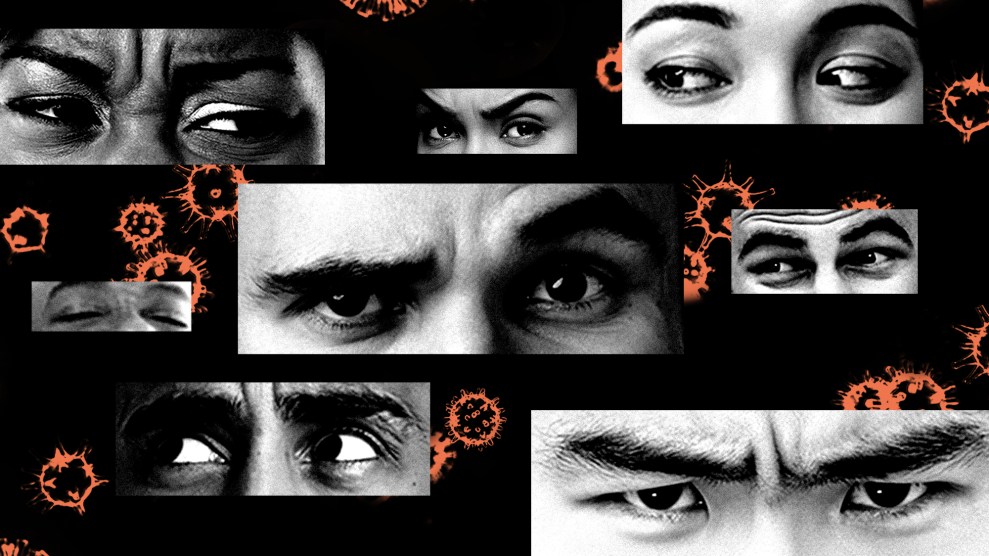
Mother Jones illustration; Getty
Laura Thompson
Am I the asshole? After a year of scrolling past not-so-socially distanced wedding photos, travel updates, and holiday posts, I finally broke down and purged my social media. I unfollowed hundreds of people—mostly acquaintances from cities I no longer live in—because I simply couldn’t handle the constant surge of anxiety I felt every time I saw one of them dining indoors with a dozen other friends.
Around that same time, a stranger yelled at me for not wearing a mask while walking my dog at the park. It seemed like an overreaction, given that we were outdoors and so far apart that she had to yell for me to hear her, so I kept my mouth shut and spent the rest of my walk stewing in some combination of irritation and shame.
So am I the asshole? Are all of my distant acquaintances assholes? Is the lady from the park an asshole? Yes. Yes to all of the above.
But it’s not entirely our fault.
The public health messaging around COVID-19 has been shaky from the start. First, Americans were told not to worry about the virus; it was just “one person coming in from China.” Next we were advised not to wear masks but banned from spending time outdoors, at places like parks and beaches. For a while we Cloroxed our groceries.
Nationwide, we reversed course on some of those early practices, but the average person’s risk assessment has still grown ever murkier. Some (Republican) governors have ignored CDC recommendations and rushed to reopen their states, threatening local officials who are taking a more measured approach in the process. Around the holidays, some people started giving in to “pandemic fatigue,” deciding that the mental health benefits of visiting long-lost loved ones outweighed the known risks of multi-household gatherings. Now, we’re navigating the vaccine era: Should you get the Johnson & Johnson shot or hold out for a more effective mRNA cocktail? How safe are mixed-vaccine-status gatherings? Can you require proof-of-vaccination for event attendees? How can you possibly enforce outdoor mask requirements only for the unvaccinated?
Without universally agreed-upon best practices being promoted by government officials, Americans were left to fend for themselves and judge their friends accordingly. When I asked Mother Jones readers (and my few remaining friends) whose behavior had been getting to them the most recently, their answers were overwhelmingly virus-related.
Friend held a maskless wedding where they explicitly said to not talk about COVID or you had to put money in a jar….
— Abby Jessen (@abbyjessen) April 14, 2021
Our two next-door neighbours bitching to me about each other about how many people the respective other has over, and “I WOULD NEVER!”. Both entertaining tons more than we do. 🤷🏼♀️
— Menschin (@MenschinDD) April 14, 2021
America has grown increasingly divided in recent years, but the pandemic threw a wrench in relationships in unprecedented ways. r/AmITheAsshole, the reddit channel for airing grievances and voyeuristically consuming strangers’ interpersonal conflicts, put a moratorium on COVID-related posts in March 2020. To paraphrase one of the channel’s moderators: There were too many posts, they were all basically the same, and the comments section could quickly become cesspools of misinformation. Even the online hub for commiserating about shitty friends couldn’t handle the pressure the pandemic has put on relationships.
Countless think pieces have been written about the nature of friendship post-pandemic. Some are cheering the return of casual friendships; others are hoping their social circle stays pared down when everything else returns to normal. My personal wish is a bit more abstract, though. I want to stop thinking about how frequently my friends wash their hands. I want to stop worrying that the Easter brunch hosted by someone from my hometown will be the superspreader event that eventually kills my parents. I want to forget that some of my friends were sharing Plandemic memes. But I’m not sure I can. Global pandemic or not, am I really comfortable sharing finger foods at a Super Bowl party with people who don’t believe in preventative health care?
When I asked my very nonscientific sample of people how likely they were to be able to move past their friends’ perceived transgressions, the answer was generally “Who knows?”
“I don’t think it’s something that will sour [our relationship] permanently, but it does create some hesitancy going forward,” one Mother Jones reader told me.
Only time will tell, I suppose. Some relationships may remain on permanent hiatus, while others may recover after the virus is (hopefully) depoliticized. Inevitably, someone else will do something irritating or downright offensive, and perhaps the memory of your friends’ armchair public health advise will fade. In fact, as the country continues to reopen, we’re in for a return to the rude behaviors of yore: co-workers who steal your clearly labeled leftovers, cousins who bring an uninvited plus-one to weddings, men who manspread on public transit.
Some people will always be assholes, but hopefully anti-maskers and other COVID jerks will soon be a thing of the past.













